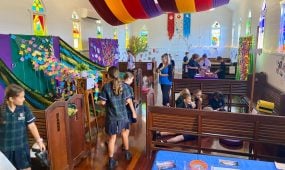“By shopping more ethically, we can help eradicate global trafficking”
Features
“Outland Denim is based on Tambourine Mountain in our Diocese’s geographical area. They manufacture and market jeans and other clothing items. They are scrupulous about their material supply chain and pay their Cambodian employees fairly. Seventeen per cent of their employees in Cambodia report having been rescued from trafficking,” says parishioner The Rev’d John Martin from The Parish of Robina

Trafficking in persons occurs when people – usually those who are vulnerable because of poverty – are abducted, cajoled or misled into believing the promise of a better life with economic prosperity as the reward. Each year hundreds of thousands of people are stolen in this way and forced to work in factories, on farms, on fishing boats or in prostitution. One third of these people are children and girls make up a large proportion.
Imagine a scenario where parents, struggling to make ends meet, receive an invitation offering their daughter legitimate employment, safety and a comfortable life, with additional remuneration given to relieve the family from poverty. These are the kinds of tactics use by traffickers to lure young girls into slavery, with no income ultimately provided for her and her family and the girl left totally isolated.
Trafficking is a global problem. The International Organization for Migration estimates that as many as 800,000 people are trafficked across international borders each year.
Saturday 30 July in 2022 is the United Nations World Day Against Trafficking in Persons. This year’s theme is “Use and abuse of technology” and focuses on the role of technology to either enable or impede trafficking.
The Internet and digital platforms give traffickers many tools to recruit, exploit and control victims; to easily arrange their transportation; provide a market place for potential buyers; enable communication between perpetrators; and, help to hide profits – and all that with greater efficiency, cost-savings and anonymity.
Advertisement
However, future success in eradicating human trafficking will depend on how law enforcement, criminal justice systems and others use technology in their responses. For Technology is also being used for good in prevention and awareness-raising activities, including about the safe use of the Internet and social media to help mitigate the risk of people becoming victims.
The day after World Day Against Trafficking in Persons is marked, in Sunday services we will hear Jesus tackle the nature of greed. In Luke 12.13-21 Jesus tells a story of an already rich man building bigger barns to enable him to store even more riches. Jesus told the story of two brothers who had a dispute over their inheritance. Jesus helped by reminding them, and us, about how greed can damage a person’s soul. Trafficking is a despicable expression of greed and indifference to humans and their suffering. What can we do?
We can become informed through such organisations as Be Slavery Free and other groups who are alerting us to the evils of trafficking.
For example, Fair Trade organisations are playing an important part in eradicating trafficking.
When farmers, workers and artisans in Majority World countries are paid a fair wage and work in good conditions, and when their children can go to school and housing and healthcare are adequate, families are less likely to be cajoled or tricked into letting their children go, thinking they will be employed. Thus, Fair Trade reduces the supply side of trafficking.
Advertisement
On the other side, once people have been trafficked Fair Trade enterprises play a large part in releasing people from the bonds of slavery and gives them worthwhile work to do. Other highly respected ethical organisations are also actively working to eradicate trafficking and slavery.
For example, Outland Denim works on both sides of the trafficking and rescue divide. Outland Denim is based on Tambourine Mountain in our Diocese’s geographical area. They manufacture and market jeans and other clothing items. They are scrupulous about their material supply chain and pay their Cambodian employees fairly. Seventeen per cent of their employees in Cambodia report having been rescued from trafficking.
Governments and large non-government organisations can do much to address the problem of trafficking. We have the power to do our bit, too. By shopping more ethically, we can help eradicate global trafficking.
Here are three things we can do to help eradicate trafficking:
- Mark World Day Against Trafficking in Persons in your parish, school, ministry or agency.
- Find out more about how you can support Fair Trade by switching to everyday products that are Fair Trade certified.
- Sign a petition that bans goods made with forced labour, including this Be Slavery Free petition that addresses Uyghur forced labour.





